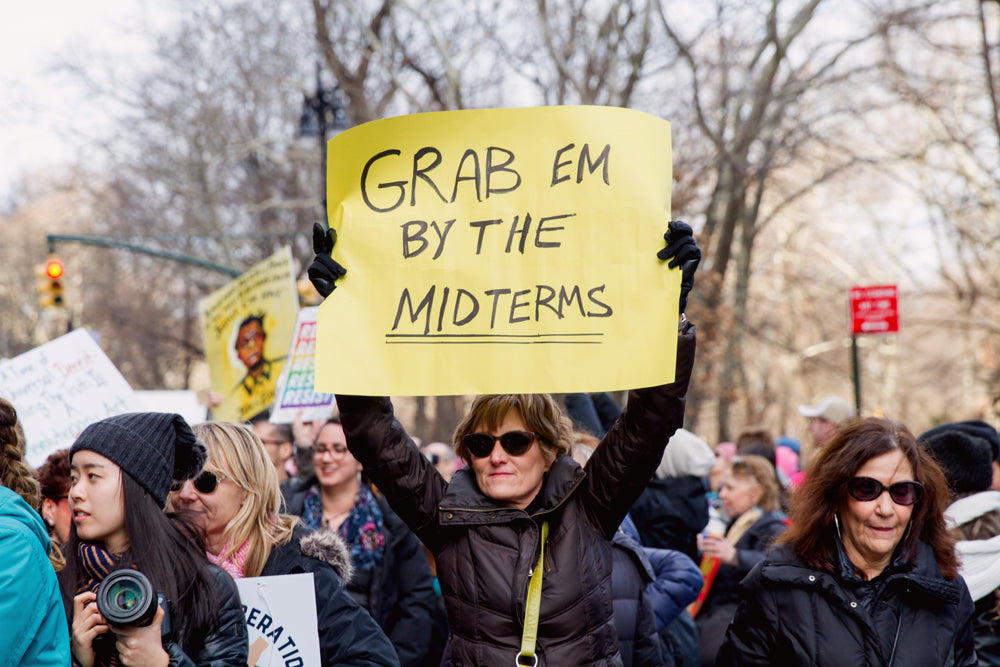
The Crumbling Dream of Reproductive Freedom in America
Guest BloggerReproductive rights in the US have been under attack for decades. Our guest blogger Mika Doyle shares her political awakening to their erosion, and explains why it's more crucial than ever to fight for the right to choose.
Growing up in America, I never imagined my reproductive rights would ever be at risk. Call it naivety or childish optimism, but I have always viewed abortion and birth control as such fundamental human rights that I thought the Roe vs. Wade decision was like an iron-clad foundation beneath the U.S. health care system.
But I’ve been fortunate enough to be insulated from much of what others have had to fight for over the last few decades because — without knowing it — I’ve sat in a place of privilege that hid the realities of the battle for reproductive freedom. I’ve always had health insurance. I’ve always had access to medical professionals. I’m biracial, so I can pass for white, and I was able to obtain a college education.
It wasn’t until a few years ago when access to birth control started to get cut off based on employers’ religious beliefs that I started to pay attention. I had just turned 30, and I was working for a non-profit Catholic health care system. Suddenly, a basic health care need that I had taken for granted had been stripped away from me. I was blindsided. I thought, surely America would never take steps that far back. Right?
What I didn’t know is that the battle for reproductive freedom hadn’t ended with Roe vs. Wade. According to Marlene Gerber Fried, since Roe vs. Wade was passed, efforts to restrict access to abortion have continued over the last 40 years, with the main strategies including passing legislation that restrict abortion access, appointing anti-abortion judges, running anti-abortion campaigns, and violent criminal attacks on abortion providers and clinics. So even though abortion is technically legal, access to safe abortion services is severely restricted for many people.
“Currently the promise of Roe vs. Wade is in many ways an empty one for so many people across the country,” Megan Donovan of the Guttmacher Institute, a nonprofit that focuses on abortion rights and women’s health, told the LA Times
According to the LA Times, today one in five people need to travel at least 43 miles to reach the nearest abortion clinic. Six states have only one abortion provider, says the LA Times, and one of those states — Kentucky — might be the first state to have no abortion providers after the state challenged the legality of its last abortion clinic back in 2017. “The burden of travel is not just distance and time. It’s also money and time off of work and child care,” Donovan told the LA Times. What’s more, says the LA Times, more than 1,100 abortion restrictions have been passed since Roe vs. Wade.
What about the right to contraception? That’s been a moving target, too. According to PBS, the Equal Employment Opportunity Commission ruled back in 2000 that contraception must be covered by employers’ health insurance. Then in 2012, The Obama administration required health insurance plans to fully cover the cost of birth control but ended up having to roll back on that for some small companies, Vox reports. But, as I mentioned previously, according to TIME, some people had religious objections, and the fateful Hobby Lobby decision ruled that employers didn’t have to cover birth control if it conflicted with their religious beliefs.
So are employers still required to cover birth control? Well, back in October 2017, President Trump rolled back on the Obama-era birth control coverage, basically saying that companies can just cite a “moral” objection to covering birth control, according to TIME. They don’t even have to have a religious objection, says TIME; they can just say they don’t want to cover birth control.
With major changes happening on the United States Supreme Court, reproductive rights in America are likely about to change even more dramatically in the coming years. According to the Center for Reproductive Rights, if Roe vs. Wade is overturned, 22 states could completely ban abortion, and eight other states will be at risk of losing the right to abortion. And TIME says there’s also a chance that if Roe is overturned, the constitutional right to birth control will also be eliminated. If feels like a dystopian novel I was meant to read about, not actually live through.
I am lucky that I will live through this with the financial and emotional support of my family. But there are so many others — people without the socioeconomic means that I have — who will not survive these changes. It is for them that people like me must fight.
Photo by Mirah Curzer on Unsplash




